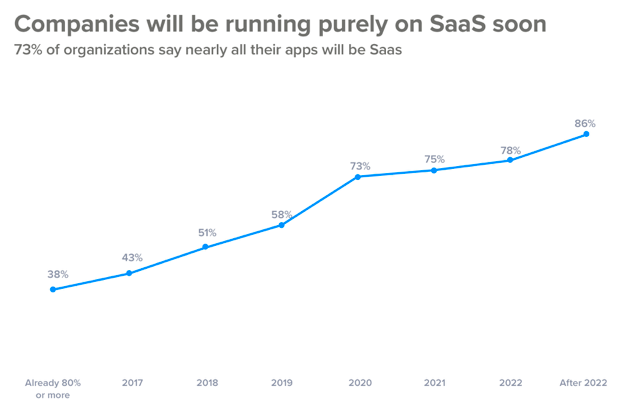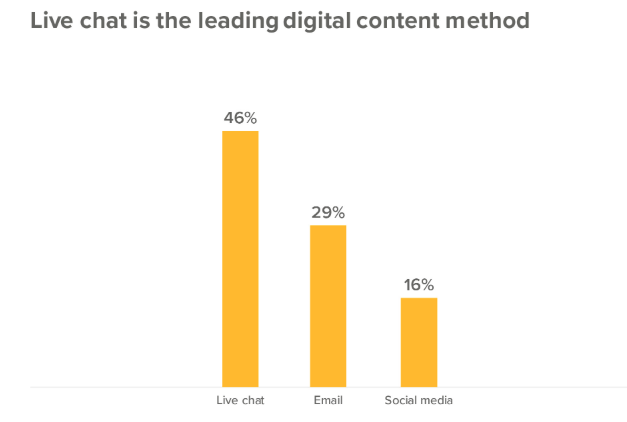For any business to excel, impeccable customer service is simply non-negotiable. Great customer service will not only pull in new clients for you, but it will also improve customer loyalty.
Whether it be through software innovations or cutting-edge AI, technology is revolutionizing the way we deal with consumers and will continue to do so.
Here are 5 powerful ways technology will influence customer service in the foreseeable future.
SaaS IS The Future
The corporate mobile SaaS market is predicted to reach $7.4 billion by 2021 (Strategy Analytics)
The corporate mobile SaaS market is predicted to reach $7.4 billion by 2021. @SA_update Share on XPart of the reason the value of SaaS software is skyrocketing is because companies can now use it to track requests and tackle unforeseen customer issues.
For example, thanks to help desk ticketing systems, customer care representatives can receive a comprehensive view of each customer’s interaction history. The automatically stored and retrieved information can then be used to address issues more effectively.
Moreover, if a customer is served by multiple representatives on separate occasions, SaaS help desk solutions can ensure they won’t have to waste their time answering the same questions over and over again.
With the SaaS ticketing system, this issue is a thing of the past.

(Source: BetterCloud)
Email Will Be Replaced By Real-Time Messaging
It’s no secret that customers want fast, responsive service.
That is why live chat is quickly becoming the preferred channel of communication over email.
Live chat has become the leading digital contact method for online customers, as a staggering 46% of customers prefer live chat compared to just 29% for email (SuperOffice).

(Source: SuperOffice)
Facebook Messenger is another instant messaging platform that is revolutionizing the way companies interact with their clients.
20 billion messages are sent between people and businesses every month using Facebook messenger (SocialMediaToday).
20 billion messages are sent between people and businesses every month using Facebook messenger. @SocialMediaToday Share on XThus, today’s customer has come to expect being able to chat with their favorite brands using their preferred channel of communication.
Of course, if you’re running a business, you can still use email to share important documents or information.
However, if you don’t invest time into implementing a real-time messaging strategy, you’ll be left in the dark ages.
Blockchain Will Revolutionize Customer Support
Blockchain is the technology that enables the existence of cryptocurrency (among other things). Bitcoin is the name of the best-known cryptocurrency, but others, like Ethereum, are also prominent and have a significant impact on the Ethereum price in the market, just as the Solana price reflects its growing adoption and market trends.
A cryptocurrency is a medium of exchange, such as the US dollar, but is digital and uses encryption techniques to control the creation of monetary units and to verify the transfer of funds.
– Scott Likens, PwC
Paying with cryptocurrency isn’t radically different from paying with other currencies.
Cryptocurrency exchange platforms typically facilitate traditional blockchain transactions between users, with many also providing real-time updates like the BTC price today.
However, blockchain technology is the future for customer service, especially when it comes to contracting and transparency.Companies can also explore blockchain development to enhance transaction security and establish trust in digital exchanges.
Instead of the existing payment methods, technology-powered contracts can accomplish payment and contract terms without any human intervention.
This translates to no more bickering over delayed payments, and these digital exchanges are leaps and bounds ahead of human speed and reliability.
Data-Driven Customer Service
As service technology is being adopted at an increasing rate, your company’s customer service team or outsourced live chat support wings will also become increasingly dependent on surveying the success of such programs.
Thus, in order to be effective, your service technology should also have a way of being quantitatively measured.
This will be the only way you will know if your software initiatives are having a positive impact.
By 2020, more than 40% of all data analytics projects will relate to an aspect of customer experience (Gartner).
By 2020, more than 40% of all data analytics projects will relate to an aspect of customer experience. @Gartner Share on XThis means there will be a massive circulation of valuable data throughout customer service departments.
Thankfully, service technology is capable of analyzing large amounts of data and organizing it, so it can be utilized to identify customer roadblocks or specific needs. In addition you could also use virtual data rooms to enable simple, fast, and secure data sharing for your business.
This data is equally beneficial for the sales and marketing teams.
For instance, the sales team can use data to better understand customer needs, and, in turn, craft more personal sales pitches.
Social Media Customer Service Will be Normalized
Thanks to social media proliferation, anyone can now review brands and services on a public forum.
This also means that a bad customer experience can be recorded and subsequently uploaded for millions of people to see.
Remember, customers are easily influenced by the opinions of other customers, so always be on your toes.
88% of consumers trust online reviews as much as they trust personal recommendations. @invesp Share on X88% of consumers trust online reviews as much as they trust personal recommendations (invesp).
Regardless of what approach you take, your company will have to formulate a game plan to respond to spontaneous social media interactions promptly and effectively.
How Does Technology Improve Customer Service?
Technology enhances customer service by streamlining processes, improving communication, and personalizing customer interactions. Tools like AI-powered chatbots provide instant responses to common inquiries, reducing wait times and increasing efficiency. Customer relationship management (CRM) systems enable businesses to track interactions and preferences, offering personalized support and building stronger relationships.
Additionally, automation tools simplify routine tasks like ticket routing, freeing up agents to focus on complex issues. Self-service options, such as knowledge bases and FAQs, empower customers to resolve problems independently. Advanced analytics help businesses identify trends, predict customer needs, and proactively address potential concerns.
Overall, customer service technology improves response speed, accuracy, and satisfaction while reducing operational costs. It ensures businesses can meet modern customer expectations with innovative, scalable solutions.
Conclusion:
Every day, we are seeing new software and technologies pop up to make our daily lives easier and more convenient.
The customer service industry is a prime example of a sector that has benefited from technological evolution. As a result, customer service interactions will continue to become more reliable, faster, and more intimate.
The trick will be to keep up with these changes, so your company can reap the benefits.




